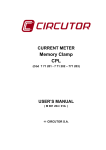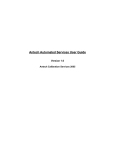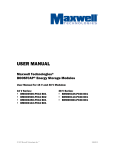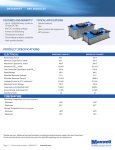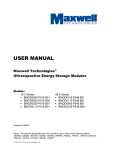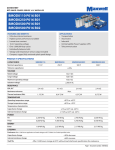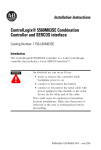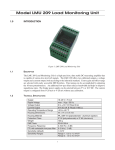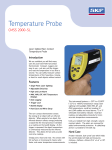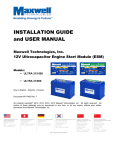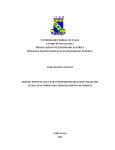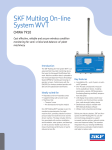Download USER MANUAL
Transcript
Preliminary Information Document not yet released. USER MANUAL Maxwell Technologies® Ultracapacitor Energy Storage Modules Models: BMOD0058 E016 B02 BMOD0006 E160 B02 BMOD0006 E150 B02 Document 3000200.1 Notice: The products described herein are covered by one or more of the following patents: 7307830, 7203056, 7027290, 7352558, 7295423, 7090946, 7508651, 7492571, 7342770, 6643119, 7384433, 7147674, 7317609, 7495349, 7102877 © 2012 Maxwell Technologies, Inc. 1. Introduction The BMOD0058 E016 B02 (16 V), BMOD0006 E150 B02 (150 V), and BMOD0006 E160 B02 (160 V) energy storage modules are self-contained energy storage devices comprised of either six, fifty-six, or sixty individual ultracapacitor cells, respectively. The modules include passively balanced ultracapacitor cells that are wave soldered to a printed circuit board. Units may be connected in series to obtain higher operating voltages, parallel to provide additional energy storage, or a combination of series/parallel arrangements for higher voltages and energy. To provide long life, passive balancing is used to provide an equal voltage bias to individual cells. The module packaging is a rigid plastic enclosure. The enclosure is water resistant (per IEC 529 – IP54). BMOD0006 modules have a voltage center tap for monitoring purposes. 2. Unpacking and Handling 2.1 Unpacking Inspect the shipping carton for signs of damage prior to unpacking the module. Damage to the shipping carton or module should be reported to the carrier immediately. Remove the module from the shipping carton and retain the shipping materials until the unit has been inspected and is determined to be operational. NOTE: The original shipping materials are approved for both air and ground shipment. The shipping container should contain the following: 1 x Energy Storage Module, part number determined by module type 1 x Product Information Sheet If the unit is found to be defective or any parts are missing, contact your supplier. A Return Material Authorization (RMA) number must be issued prior to returning the unit for repair or replacement. 2.2 Handling Maxwell ultracapacitor modules are designed to provide years of trouble-free operation. Proper handling is required to avoid damage to the module. In particular, the following handling precautions should be observed: Do not stack modules once they have been removed from the shipping containers. Do not drop modules. exterior. Do not step on modules. Internal damage may occur that will not be visible from the User Manual – BMOD0058 & BMOD0006 – Doc. No. 3000200.1 © 2012 Maxwell Technologies, Inc. Page 1 3. Installation 3.1 Mechanical Modules have 6 (BMOD0058) or 12 (BMOD0006) clearance holes for mounting screw locations. The modules can be mounted in any orientation. General mechanical and mounting information is shown in Figures 1 and 2. datasheet for additional dimensional information. Please see the Terminal screws: M5 Maximum torque: 4 Nm Mounting points (6x) M4 x 40mm screws Maximum torque: 4 Nm Figure 1: BMOD0058 Mechanical Configuration Terminal screws: M5 Maximum torque: 4 Nm Mounting points (12x) for M5 x 30mm screws Maximum torque: 4 Nm Monitoring terminal screws: M4 Maximum torque: 3.5 Nm Figure 2: BMOD0006 Mechanical Configuration For best results the modules should not be mounted in locations where they are directly exposed to the environment. The modules are built to IP-54 standards. In particular, areas of direct splash should always be avoided. In systems that operate at voltages in excess of 60 V, appropriate protection and sealing should be used on module terminals to avoid shock hazards and corrosion. Note that the terminals are fully exposed to the environment. User Manual – BMOD0058 & BMOD0006 – Doc. No. 3000200.1 © 2012 Maxwell Technologies, Inc. Page 2 Dimensional spacing of the mounting holes for the modules is shown in Figures 3 and 4. It is recommended to leave 1 cm of spacing between modules when mounting them next to each other on the same mounting plate or fixture. Figure 3: BMOD0058 Mounting Hole Locations Figure 4x: BMOD0006 Mounting Hole Locations – Early Samples Only User Manual – BMOD0058 & BMOD0006 – Doc. No. 3000200.1 © 2012 Maxwell Technologies, Inc. Page 3 Figure 4: BMOD0006 Mounting Hole Locations A proper installation should not exert any bending or twisting torque to the module enclosure. Ensure that the module’s mounting points are co-planar within ±1 mm. If the actual mounting location is out-of-plane, use spacers to bring all four mounting locations within plane to within ±1mm. Both the BMOD0058 and BMOD0006 modules have been qualified to IEC60068-2-6 for vibration performance. Ensure that this is adequate for the end-use environment. To ensure meeting specified vibration performance, all mounting points should be used. If more severe vibration performance is required, consider the use of isolators to provide damping. Contact Maxwell Application Engineering for assistance in these cases. User Manual – BMOD0058 & BMOD0006 – Doc. No. 3000200.1 © 2012 Maxwell Technologies, Inc. Page 4 3.2 Electrical WARNING CAUTION To avoid arcing, the energy storage module should be in a discharged state and the system power disconnected during installation. The module is shipped discharged and with a shorting wire. The shorting wire should be removed prior to installation of electrical connections. WARNING CAUTION To provide the lowest possible ESR the energy storage modules are not fused. Care should be taken within the application to prevent excessive current flow. Excessive current and/or duty cycle will result in overheating the module and cause irreparable damage. Please consult the specific data sheet for each module for current and duty cycle capabilities. The power output terminals of the modules consist of M5 screw terminals intended to mate with spade or ring terminals. Ensure that interconnect wire is of sufficient gauge to carry the system current. The modules may be connected in series for higher voltages. As mentioned earlier, the maximum torque is 4 Nm. The BMOD0006 modules have a center-tap terminal that can be used to compare the voltage of the upper half of the ultracapacitor array with that of the lower half as a diagnostic for imbalance. This mid-point voltage is accessible through the M4 monitoring terminals as illustrated in Figure 2. The current drawn from the center tap should not exceed 10 μA. Drawing currents in excess of this amount can create imbalance within the module. The maximum torque for this M4 terminal is 3.5 Nm. The energy storage modules have low Equivalent Series Resistance (ESR). As a result, the resistance of the wires connecting the energy storage module to the application can easily exceed the ESR of the module. Connection of modules in series or parallel should utilize the same gauge wire as determined for final output connections. When connecting in series connect the positive output terminal of one module to the negative output terminal of the next module. Two possible series orientations are illustrated in Figure 5. Possible parallel orientations are shown in Figure 6. User Manual – BMOD0058 & BMOD0006 – Doc. No. 3000200.1 © 2012 Maxwell Technologies, Inc. Page 5 Figure 5: Possible Series Connection Arrangements Figure 6: Possible Parallel Connection Arrangements For both the BMOD0058 and BMOD0006 modules, the maximum allowable operating voltage for a series string is 750VDC. Full UL810a compliance is satisfied for up to forty (40) BMOD0058 modules in series, corresponding to a system voltage of 640V. The BMOD0006 is not UL810a listed. When several modules are connected in series for operating at higher system voltages, care must be taken to ensure proper creepage and clearance distances in compliance with appropriate national and local safety standards for electrical equipment. User Manual – BMOD0058 & BMOD0006 – Doc. No. 3000200.1 © 2012 Maxwell Technologies, Inc. Page 6 3.3 Thermal Performance It should be noted that these modules are not intended for high cycling applications. Should there be an interest in higher cycling applications, please consult Maxwell Technologies Applications Engineering. The thermal resistance, Rth, of the units has been experimentally determined assuming free convection at ambient temperature (~ 25oC). The RTH value provided on the datasheet is useful for determining the operating limits for the units. Using the Rth value a module temperature rise can be determined based upon any current and duty cycle. The temperature rise can be expressed by the following equation. T I 2 RESR RTH d f where: I = RMS current (amps) RESR = equivalent series resistance, RDC (ohms) RTH = thermal resistance (oC/W) df = duty cycle fraction The T value calculated above plus ambient temperature should remain below the specified maximum operating temperature for the module (see datasheet). 4. Accessories The following accessories are provided with modules within the accessory kit. 1 x Product Information Sheet 5. Operation The module should only be operated within specified voltage and temperature ratings. Determine whether current limiting is necessary based on the current ratings of attached components. Observe polarity indicated on module. Do not reverse polarity. User Manual – BMOD0058 & BMOD0006 – Doc. No. 3000200.1 © 2012 Maxwell Technologies, Inc. Page 7 6. Safety WARNING DANGER – HIGH VOLTAGE HAZARD! Never touch the power terminals as the module can be charged and cause fatal electrical shocks. Always check that the module is fully discharged before manipulating the module. Please refer to the step by step instructions below for the manual discharge procedure. Do not operate unit above the specified voltage. Do not operate unit above the specified temperature rating. Do not touch terminals with conductors while charged. Serious burns, shock, or arcing may occur. Protect surrounding electrical components from incidental contact. Provide sufficient electrical isolation when working above 50 VDC. Prior to installation on or removal from the system, it is mandatory to fully discharge the module to guarantee the safety of personnel. WARNING A fully discharged module may “bounce back” if it is stored without a shorting wire connected to the + and – terminals. This bounce back can be as much as 2V for the BMOD0058 and 20V with the BMOD0006. When used in series strings this has the potential to cause dangerous electrical shocks. 6.1 Discharge Procedure Proceed as follows to discharge the module: 1. Using a voltmeter, measure the voltage between the 2 terminals. 2. If the voltage is above 2V, a resistor pack (not supplied with the module) will need to be connected between the terminals. Proper care needs to be taken in the design and construction of such a dissipative pack. The resistor pack will need to be sized and provided with suitable cooling to handle the resulting power dissipation. Additionally, proper isolation and packaging are necessary to ensure safety. User Manual – BMOD0058 & BMOD0006 – Doc. No. 3000200.1 © 2012 Maxwell Technologies, Inc. Page 8 3. If the voltage is under 2V, connect a shorting wire to the + and – connectors. 4. The module is now safe for handling. However, leave the shorting wire connected at all times until the module is installed in the system and the power cables are connected. 7. Maintenance Prior to removal from the system, cable removal, or any other handling ensure that the energy storage module is completely discharged in a safe manner. The stored energy and the voltage levels may be lethal if mishandling occurs. Maintenance should only be conducted by trained personnel on discharged modules (see above). 7.1 Routine Maintenance 7.1.1 Clean exterior surface of dirt/grime 7.1.1.1 Reason - Improve power dissipation performance. 7.1.1.2 Use a cleaning cloth dampened with a water/soap solution. Do not use high-pressure sprays or immersion. Keep excess amounts of water away from the PCBA cover and power terminals. 7.1.1.3 Frequency 7.1.1.3.1 Outside use (6 months, or as needed) 7.1.1.3.2 Inside use (annually) 7.1.2 Check mounting fasteners for proper torque 7.1.2.1 Reason - Avoid mechanical damage 7.1.2.2 Frequency 7.1.2.2.1 High Vibration Environments (6 months) 7.1.2.2.2 Low Vibration Environments (12 months) 7.1.3 Inspect housing for signs of damage 7.1.3.1 Reason – allows potential internal damage to be identified 7.1.3.2 Frequency 7.1.3.2.1 Outside use (6 months, or as needed) 7.1.3.2.2 Inside use (annually) 7.1.4 Check electrical connections for proper torque 7.1.4.1 Reason – avoid false signals, shock hazards, and high-resistance connections 7.1.4.2 Frequency 7.1.4.2.1 High Vibration Environments (6 months) 7.1.4.2.2 Low Vibration Environments (12 months) 8. Storage The discharged module can be stored in the original package in a dry place. Discharge a used module prior to storage or shipment. A shorting wire across the terminals is strongly recommended to maintain a short circuit after having discharged the module. User Manual – BMOD0058 & BMOD0006 – Doc. No. 3000200.1 © 2012 Maxwell Technologies, Inc. Page 9 9. Disposal Do not dispose of module in trash. Dispose of according to local regulations. 10. Specifications Refer to datasheets at our website, www.maxwell.com, for product specifications. User Manual – BMOD0058 & BMOD0006 – Doc. No. 3000200.1 © 2012 Maxwell Technologies, Inc. Page 10 Maxwell Technologies, Inc. Global Headquarters 5271 Viewridge Court, Suite 100 San Diego, CA 92123 USA Phone: +1 858 503 3300 Fax: +1 858 503 3301 Maxwell Technologies SA Route de Montena 65 CH-1728 Rossens Switzerland Phone: +41 (0)26 411 85 00 Fax: +41 (0)26 411 85 05 Maxwell Technologies GmbH Brucker Strasse 21 D-82205 Gilching Germany Phone: +49 (0)8105 24 16 10 Fax: +49 (0)8105 24 16 19 www.maxwell.com Maxwell Technologies, Inc. Shanghai Representative Office Unit A2BC, 12 th Floor Huarun Times Square 500 Zhangyang Road, Pudong Shanghai 200122, P.R. China Phone: +86 21 3852 4000 Fax: +86 21 3852 4099 Maxwell Technologies, Ltd Suites 3 & 4, First Floor Millennium House Gapton Hall Road Great Yarmouth Norfolk NR31 ONL Phone: +44 (0) 1493 202013 Fax: +44 (0) 1493 603981













